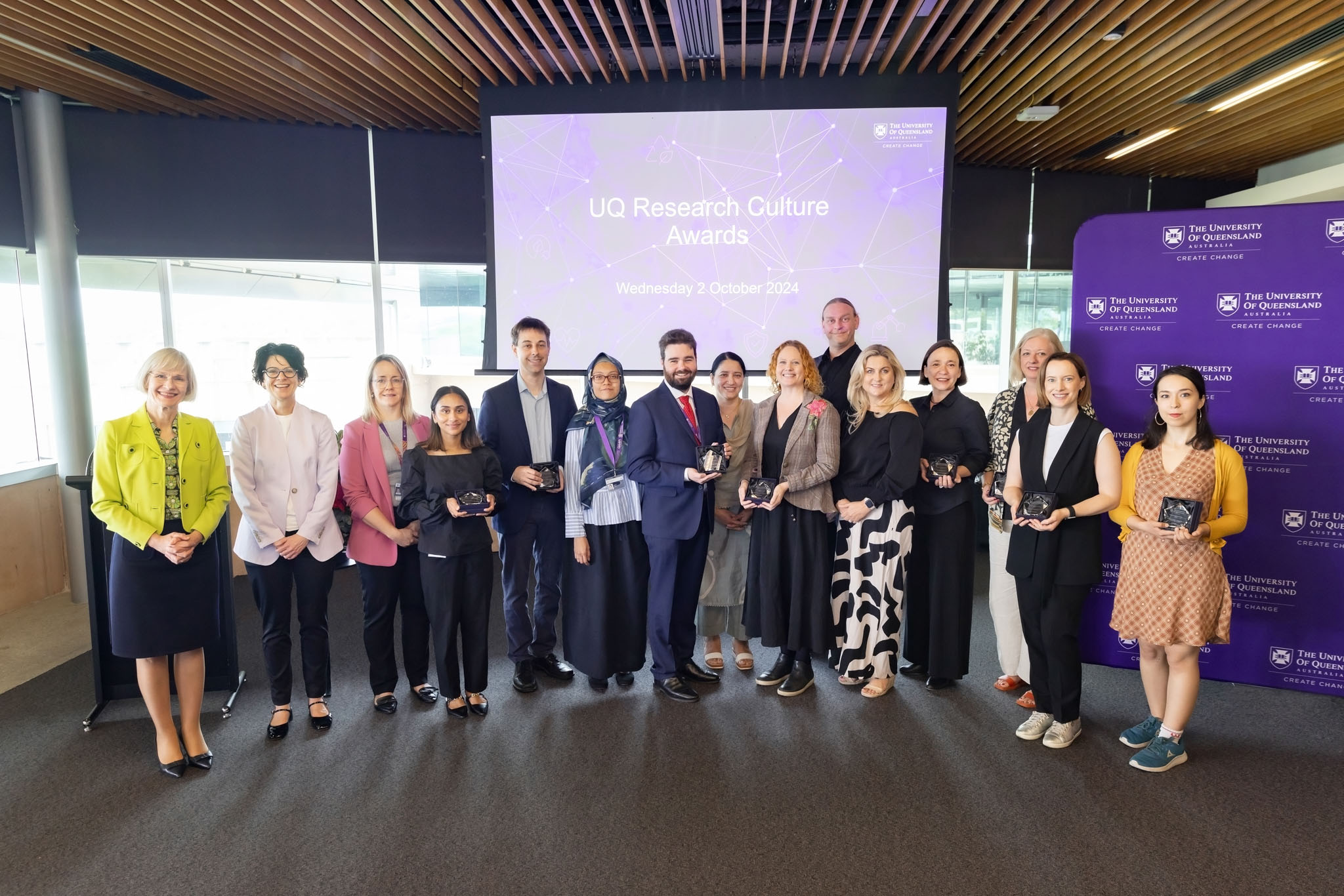UQ Research Culture Awards 2025
The University of Queensland promotes a positive research culture with integrity, inclusivity, collaboration, and innovation. The UQ Research Culture Awards celebrate outstanding staff contributions to enriching our research environment across disciplines and career stages. These awards aim to inspire a shared commitment to a sustainable research ecosystem that empowers individuals and teams to reach their full potential.
2025 Winners and Nominees

2025 UQ Research Culture Awards recipients with Professor Mark Blows, Provost and Senior Vice-President and Professor Rachel Parker, Pro-Vice-Chancellor Research
2025 Winners (Individual)
Nicole McDonald
Queensland Digital Health Centre
Nicole leads QDHeC’s Project Management Office, managing and mentoring project managers to ensure high-quality research delivery. By embedding a culture of strategic thinking and continuous improvement, she ensures QDHeC projects adhere to robust governance and management practices and are aligned with UQ best practice principles. Nicole’s leadership creates systematic approaches to project excellence while continuously developing project management capabilities across the research centre.
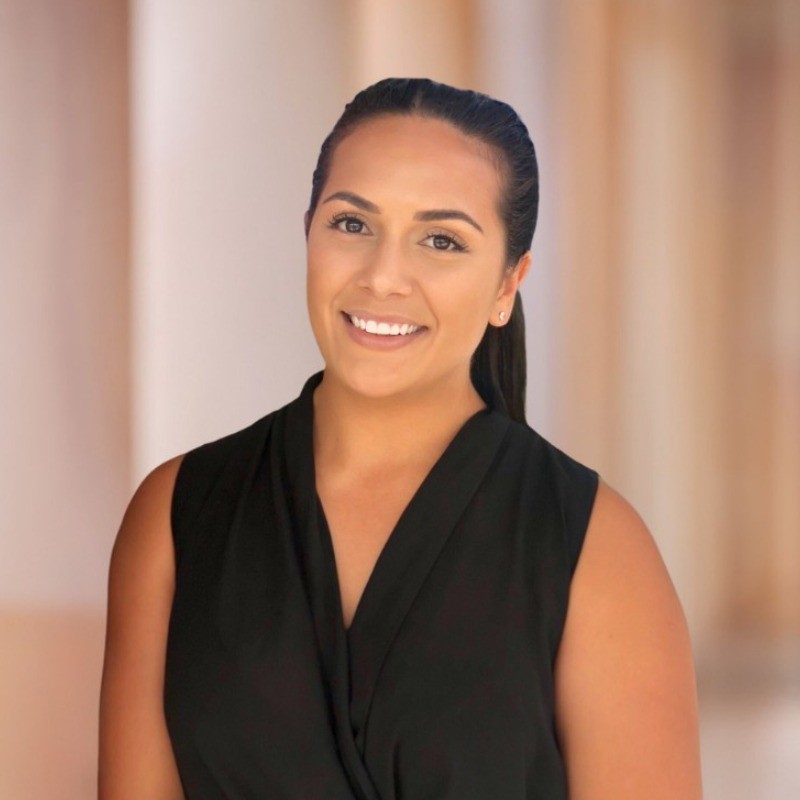
Associate Professor Ya-Yen Sun
UQ Business School
Dr Sun’s pioneering work on tourism emissions has evidenced the rapid rise in tourism-related emissions and significantly advanced tourism decarbonisation. Through key international partnerships with the United Nations World Tourism Organization and European Travel Commission her work has improved emissions measurement and mitigation over the short, medium, and long term and provided governments with data-driven tools and strategies to align tourism development with climate goals.

Professor Zuduo Zheng
School of Civil Engineering
Through his work to promote research reproducibility, Professor Zheng exemplifies UQ’s core values of Truth and Integrity, reinforcing our role as custodians of public trust in research. Zuduo has consistently advanced a culture of openness and integrity by embedding reproducibility into his research, teaching and leadership. In doing so he has helped cultivate a research culture grounded in transparency, rigour and openness – benefiting both the academic community and society.

2025 Winners (Team)
Advancing UQ Maturity in Indigenous Data Sovereignty Practices
School of the Environment and UQ Library Data Management
Through their extensive and selfless work to embed Indigenous Data Sovereignty (IDSov) into UQ’s research culture, this outstanding team are driving change in how we work together with Indigenous partners. Their work in scrutinising our current systems and supporting processes has seeded long-term shifts in how research at UQ can be conducted with greater respect, reciprocity and responsibility, moving UQ closer to a fit-for-purpose research ecosystem that enables Indigenous research.

Inclusive Food System Transformation
School of Agriculture and Food Sustainability and Queensland Alliance for Agriculture and Food Innovation
Embedding inclusion, diversity and equity at the heart of its research, this team uses a novel, locally-led approach to centre gender equality in their work to strengthen food security in Indonesia. Through robust capacity building and meaningful engagement with diverse, and often underrepresented stakeholders, they are empowering local communities through data and participatory systems thinking: informing policy dialogue to produce impactful research outcomes.

Mekong Sustainable Rice Initiative
School of Agriculture and Food Sustainability
This outstanding team is transforming Vietnam’s Mekong Delta rice sector through an innovative, impact-focused approach to research and development across agronomy, postharvest technologies, value chain analysis and gender equity. Their deep engagement with local partners to co-design and deliver sustainable solutions is driving remarkable change and fostering a more resilient and equitable international research culture at UQ.
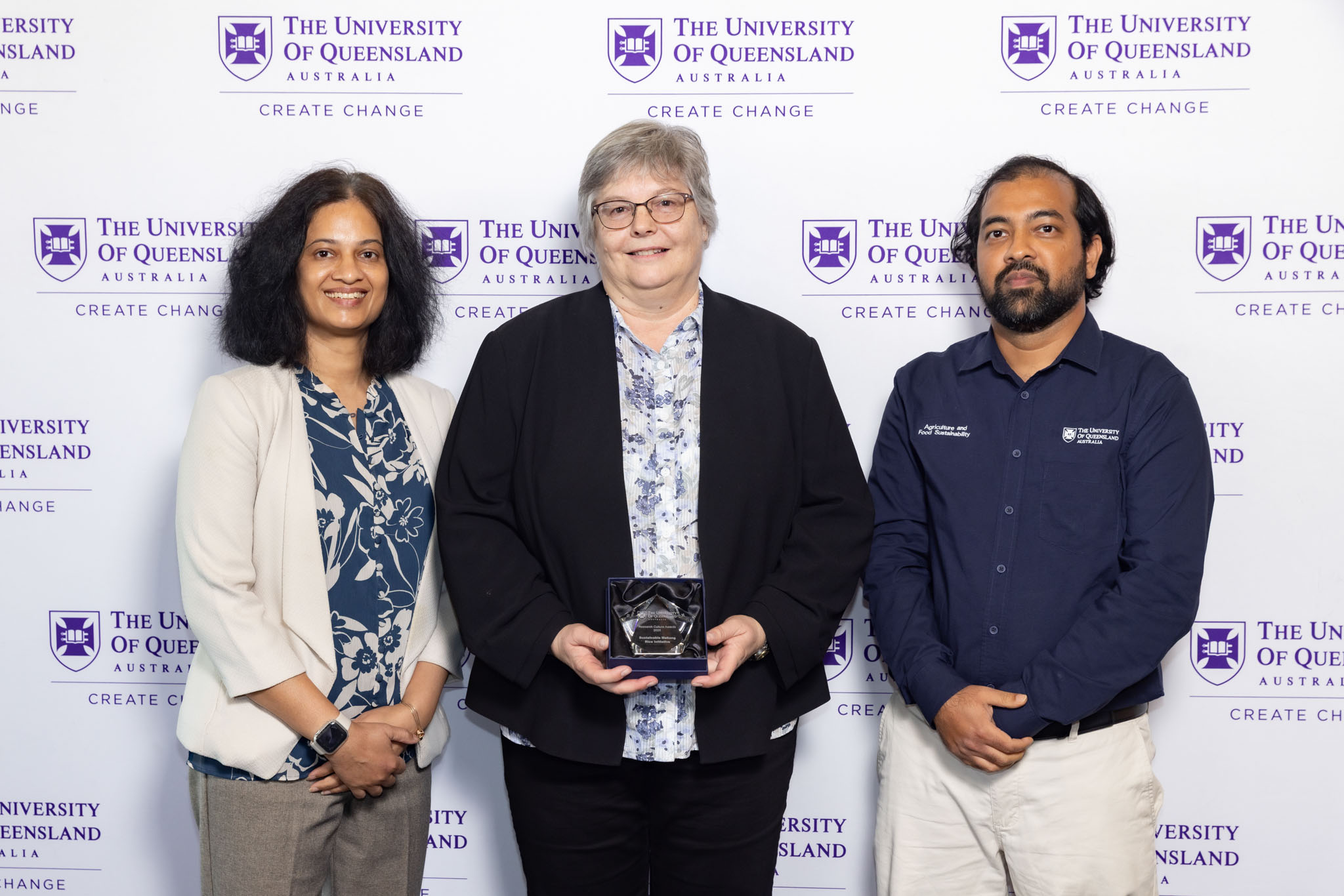
Queensland Animal Science Precinct (QASP)
Research Infrastructure
As a trusted research infrastructure partner, QASP underpins countless research projects across multiple UQ faculties by providing outstanding, collaborative support for large animal research. Consistently demonstrating unmatched professionalism, exceeding expectations and fostering excellence, their expert facilitation of the highest standards in animal care and compliance ensures research integrity and upholds UQ’s outstanding reputation.
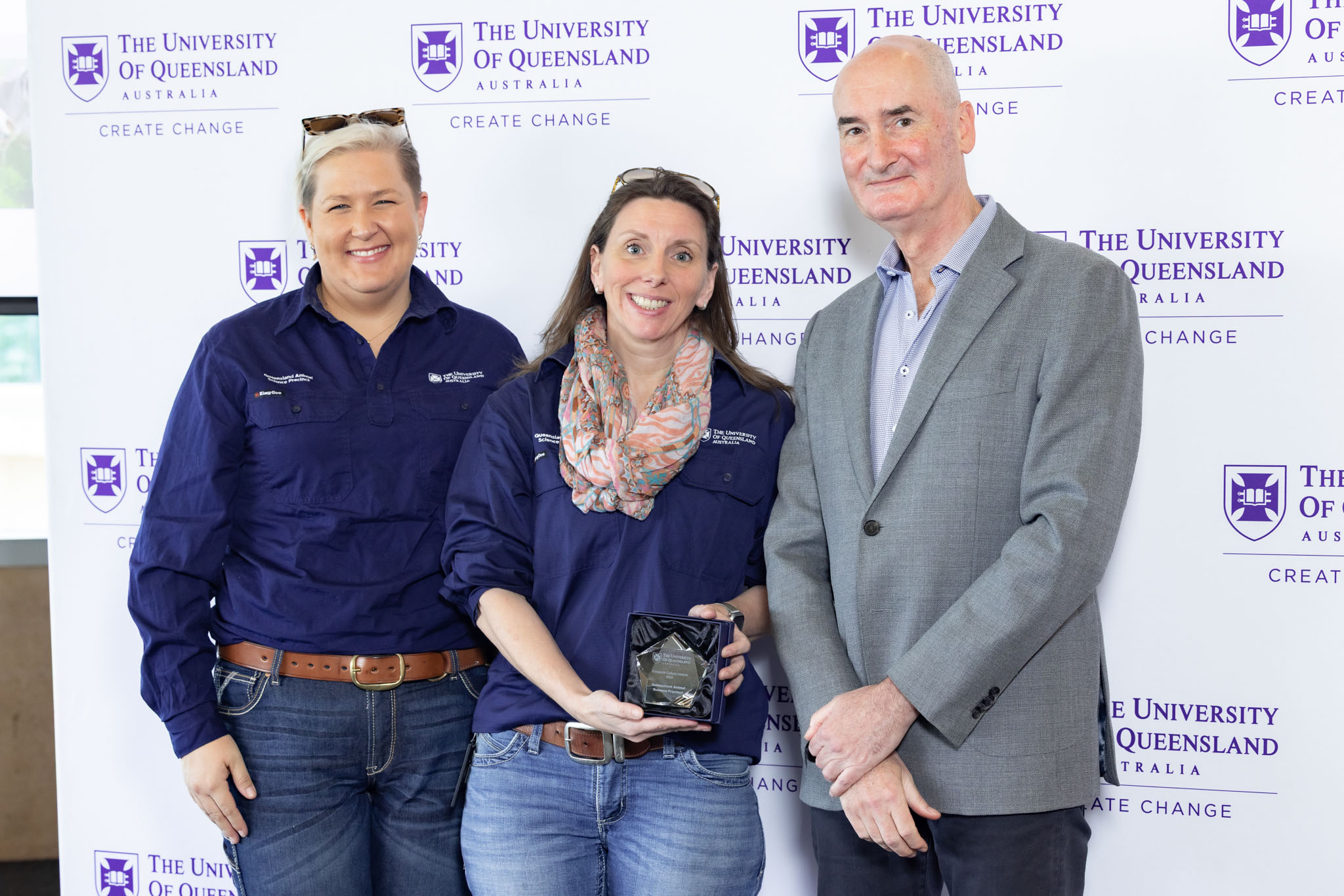
South Asian Genes and Health in Australia (SAGHA)
Institute for Molecular Bioscience and Faculty of Health, Medicine and Behavioural Sciences
The SAGHA team pioneers inclusive research to improve disease prevention in underdiagnosed groups, especially South Asians. Their MRFF-funded genomics cohort study – the first in Australia – advances understanding of genetics and heart disease. This team’s dedication to equity and innovation highlights the vital contributions of diverse communities to science; helping to shape a more inclusive and effective healthcare future.
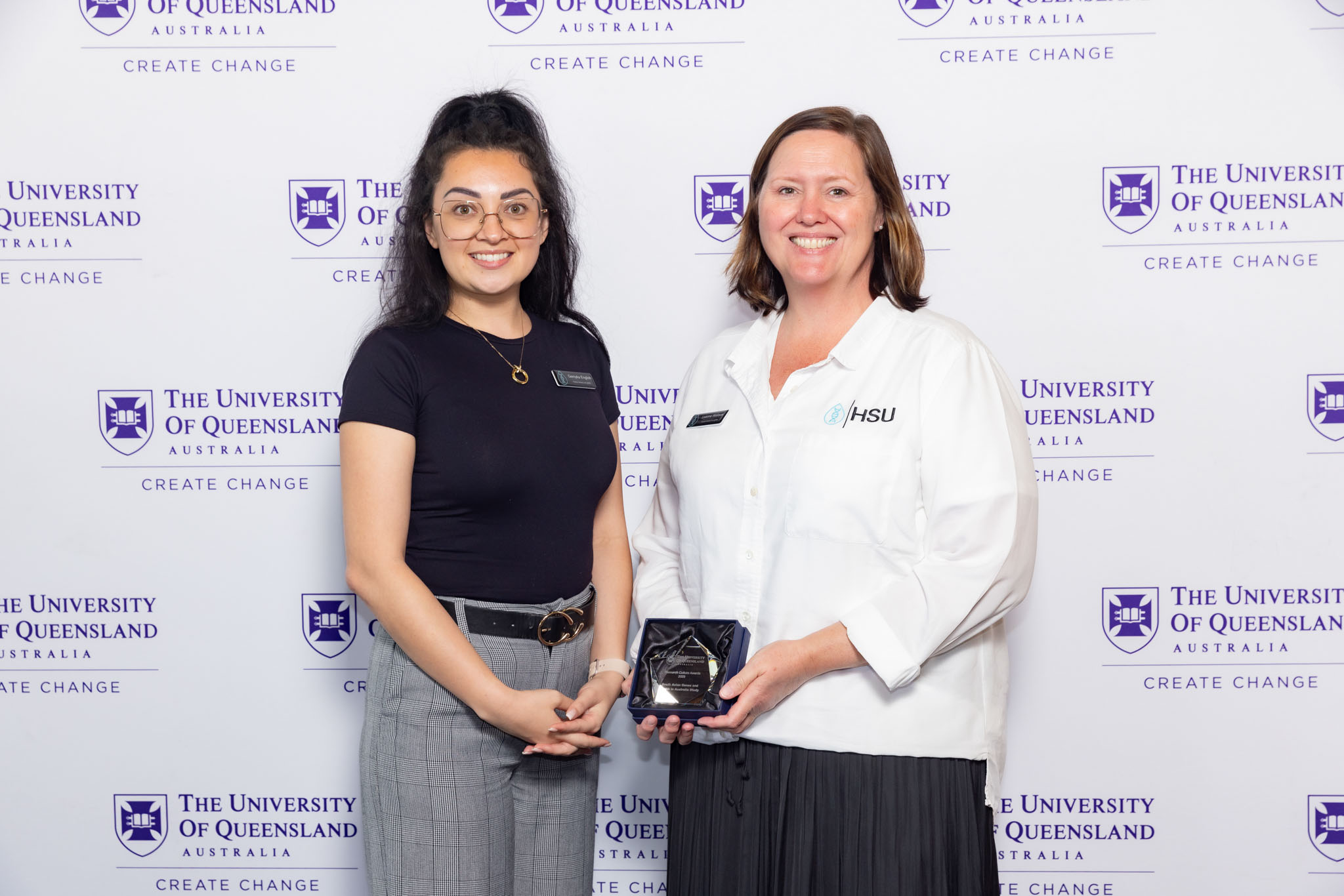
Terrestrial Ecosystem Research Network (TERN)
Collaborative Research Platform
TERN coordinates nationally distributed instrumentation that supports terrestrial and coastal ecosystem and biodiversity monitoring. The UQ team skillfully builds, maintains and supports infrastructure to enable collaborative research, demonstrating a deep commitment to identifying research community needs. Their governance and coordination activities foster national and international partnerships, creating a collaborative ecosystem that significantly enhances interdisciplinary research culture at UQ.
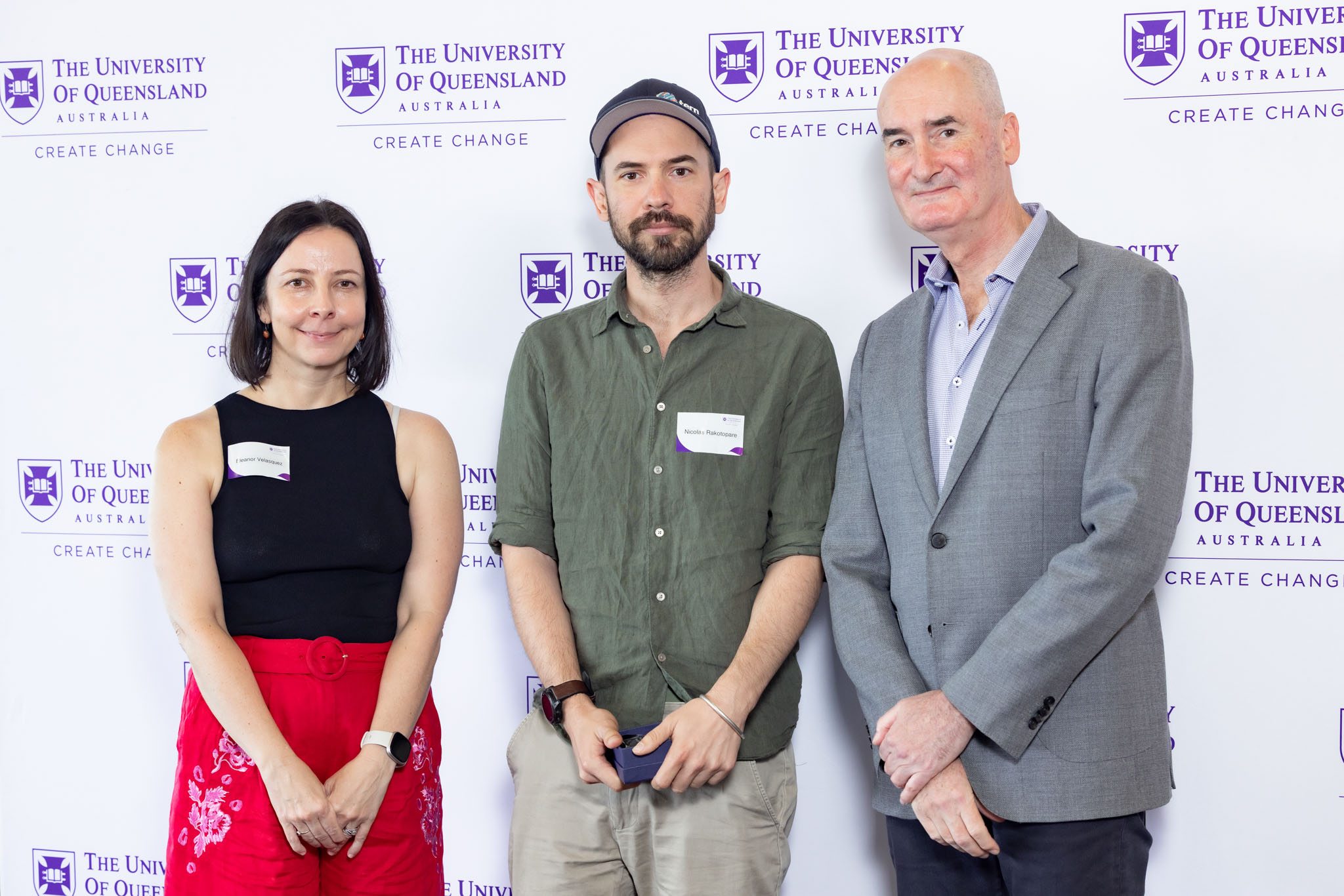
2024 Winners and Nominees
2024 UQ Research Culture Awards winners with Professor Deborah Terry AC, Vice-Chancellor and President, and Professor Rachel Parker, Pro-Vice-Chancellor Research
Conduct of Research, Reproducibility & Open Research Practices
WINNER: translatE (collected by Nayelli Rivera Villanueva from the translatE team and Assoc. Prof Celine Frere from the School of the Environment)

The translatE project - led by Dr Tatsuya Amano, Ms Violeta Berdejo-Espinola - is an innovative and world-leading project that tackles language barriers to promote integrity and collaboration in science. Since launching at UQ in 2019, its research has revealed that language barriers seriously impede open science in three key areas:
- the participation of non-native English speakers in science
- the global synthesis of scientific evidence scattered across different languages; and
- the application of scientific evidence to local decision making.
The translatE project has transformed people’s view of language barriers in open research and led to several of positive actions - both at UQ and globally - to mitigate the consequences of such barriers.
Nominees:
Associate Professor Monica Chien
Professor Helen Huang
Dr Martin Schweinberger
Professor Zuduo Zheng
Low Harm Hedonism Initiative*
Queensland Digital Health Centre*
Enhancement of Local Environment & Wellbeing of Researchers
WINNER: Dr Jean McBain, Office of the Deputy Vice-Chancellor (Research and Innovation)

Jean's contributions have yielded tangible and impactful outcomes for the research environment. Through professional contributions, the University has made positive steps in advancing equity, diversity, and inclusion (EDI) principles across research. Jean's principled approach to addressing EDI issues has permeated throughout the University, contributing to a culture of respect, understanding, and collaboration. Her commitment to amplifying the voices of marginalised groups and acting as a connector and facilitator has resulted in meaningful relationships and partnerships that have further strengthened the research ecosystem at the University.
Nominees:
Dr Ai Nguyen
Supporting Career Development for Researchers (EMCR)
WINNER: BEL Early Career Academic Program (ECAP) Faculty of Business, Economics and Law

The BEL-ECAP program - led by Associate Professors Gabby Walters and Rachel Fitzgerald - has yielded significant outcomes including improvements in career development for early career academics (ECAs), enhanced research capabilities and collaboration on key research agendas. Key outcomes include increased research output and quality, more effective integration of teaching and research, and a heightened sense of community and support among the faculty’s ECAs. Furthermore, the structured mentorship and networking opportunities provided by the program have cultivated stronger connections within the faculty, leading to a heightened sense of community and a more resilient workforce. ECAs have reported greater confidence and clarity in their career paths, a stronger sense of well-being and have attributed much of their progress to the skills, knowledge and insights gained through this career development program.
Nominees:
Professor Lauren Ball
Professor Sara Dolnicar
Professor Helen Huang
Dr Ai Nguyen
Professor Jason Pole
Associate Professor Gabby Walters
BEL Early Career Academic Program (ECAP)*
ISSR Conference, PD & Seminar*
Research Partnerships*
Public Engagement & Community-led Research (including Citizen Science)
WINNER: Let's Yarn About Sleep* Poche Centre for Indigenous Health

The Let’s Yarn About Sleep program’s extensive engagement activities have improved community awareness of sleep health and encouraged people to actively consider the impact of sleep loss. The co-designed programs and service models ensure timely access to specialist sleep services in remote areas, significantly enhancing health outcomes for these communities. Through outreach and visits to UQ campuses, the program has created pathways for First Nations community engagement with UQ research and learning activities. The program has been pivotal in cultivating First Nations sleep research leadership by training seven community researchers and establishing several strategic research positions. These community researchers have taken on prominent roles in Australian sleep health research, including significant involvement in grant applications, co-authoring scholarly articles, and participating in national-level conferences and committees. The program’s extensive outreach efforts have sparked robust engagement, drawing requests from several communities to adopt the Let’s Yarn About Sleep program.
WINNER: Dr Kiah Smith Centre for Policy Futures

Dr Kiah Smith’s contributions directly benefit food system transformation through her creative and highly engaged approach to knowledge co-creation with civil society and have already resulted in significant policy impact. In particular, ‘Fair Food Futures’ has been translated to public, policy and advocacy audiences via an animation and 8-episode podcast, supported by Future Earth. The animation has raised awareness of food justice and directs the public towards practical actions to progress the SDGs.
WINNER: Professor Anthony Smith Centre for Online Health (collected by Dr Soraia Catapan and Roshni Mendis from the Centre for Health Services Research)

Professor Anthony Smith’s major research achievements have included the evaluation of wireless (robot) videoconference systems in paediatric wards; and a community-based telemedicine health screening programme for Indigenous children in Queensland. His current projects include the evaluation of telehealth applications in primary care settings and Indigenous communities; the delivery of tele-rehabilitation services into primary schools; online mental health support services in remote locations; and discipline specific clinical telehealth services in Queensland. For nearly two decades, Professor Smith has been working in partnership with the Cherbourg community, to establish a telemedicine service for the routine screening of Indigenous children at high risk of chronic health conditions.
Nominees:
Dr Christine Andrews
Dr Bushra Nasir
Dr Vaishnavi Nathan
Dr Timothy O'Rourke
Associate Professor Kym Rae
Dr Anthony Romilio
Australian Frailty Network*
Brain Builders Initiative*
ID-INSPIRED project*
Intellectual Disability and Autism Service (MIDAS)*
LEAP Research*
MRI-UQ*
Purpose Built Exhibition*
Queensland Aphasia Research Centre*
Queensland Centre for Online Health*
Leadership in Research Support & Management
WINNER: RCC Core Infrastructure Support* UQ Research Computing Centre

This small team of three within the RCC supports over 3,000 individuals across UQ and the local sector to make the very best use of UQ's vibrant, cutting-edge high-performance computing technologies and eResearch infrastructure. Marlies, David and Edan have all come from research, grew up in this space and care for it deeply, helping to enable our researchers, caring for their outcomes, culture and the various and complex domain needs. Each with their own incredible experience in specific domains of science, they bring supportive culture, care, diligence and focus to all those that need their assistance.
WINNER: QAAFI Business Development & Commercial* Queensland Alliance for Agriculture and Food Innovation

The QAAFI Business Development and Commercial teams have driven large positive change across QAAFI. The primary accomplishment was driving the ZNEAg CRC development and establishment, especially in the effort to get 73 partners signed who committed $87M in cash. In addition, they have constructed in-house tracking and research pipeline systems to monitor QAAFI researcher ideas/projects before and after application as well as tools to track contract progress through our grants and partnership areas. Collectively, these tools provide visibility of progress of QAAFI strategic funding, tracking external revenue targets, visibility of our DAF alliance activities and contracting/legal processes.
WINNER: Professor Sara Dolnicar UQ Business School

In sharing her own work, and in training and supporting the next generation of social scientists in open, sharing, supportive and kind research practices, Professor Dolnicar's legacy is twofold: Research insights about sustainability and human behaviour have already had impact beyond UQ. Industry have access to research outcomes that can be directly applied in the Australian and international tourism landscape and lead the way to sustainability. Secondly, Professor Dolnicar has demonstrated that young researchers she supervises are well trained, well connected, kind and ethical. They are well equipped to tackle current and future challenges and promote the same values in their own research communities and younger generations after them.
Nominees:
Dr Madonna Devaney
Professor Sara Dolnicar
Professor Helen Huang
Dr Marc Kamke
Dr Emma Livingstone
Jo Maxwell
Lenny McInnes
Dr Ai Nguyen
Associate Professor Amirali Popat
Dr Susan Sullivan
Dr Amberyn Thomas
Dr Chenhao Zhou
Major Initiatives*
*Team
2023 Winners and Nominees
Conduct of Research, Reproducibility & Open Research Practices
WINNER: NeuroDesk management
The NeuroDesk management team has created a collaborative, open-source platform for transparent neuroimaging data analysis. This initiative lowers barriers for researchers, offering access to open data, software, and educational resources, thus promoting transparency and collaboration within the research community. The project has gained widespread adoption with over 1000 users from 47 countries in the past year. NeuroDesk enhances reproducibility by providing standardised analysis environments and fosters innovation through software containers, facilitating access to neuroimaging software libraries across various systems. Their commitment to excellence, documentation, and community engagement represents a paradigm shift in neuroimaging research. NeuroDesk's accessibility and support extend to UQ, nationally and internationally, making it a vital resource for researchers and educators. This team's exceptional leadership and vision are recognised across scientific communities, demonstrating the potential to expand their impact into other domains beyond neuroimaging.

Nominees:
Professor Sara Dolnicar
Associate Professor Remi Ayoko
Enhancement of Local Environment & Well-being of Researchers
WINNER: Dr Sara Gollschewski, UQ Centre for Clinical Research (collected by Anne Louise Bulloch, Faculty of Medicine)
Dr. Sara Gollschewski has shown exceptional dedication and leadership in fostering a positive research culture at the UQ Centre for Clinical Research (UQCCR) and throughout the Faculty of Medicine. As the Research Development Manager, she goes above and beyond to enhance the well-being of researchers, particularly early and mid-career researchers (EMCRs), by implementing various initiatives aimed at promoting work-life balance and professional growth. Sara actively participates in committees, including those related to equity, diversity, and inclusion (EDI), and advocates for inclusive practices. Her commitment to mental health and well-being is commendable, as she provides unwavering support, creates a safe and open environment for discussions, and offers guidance and mentorship to navigate the competitive research landscape. Sara's holistic approach extends beyond research grant rounds, encompassing skill development, confidence-building, and philanthropic funding strategies for EMCRs. She champions diversity through initiatives like the UQ ALLY network and fosters both professional and social connections within the research community.

Nominees:
Dr Danila Elango
Professor Kate Schroder
Supporting Career Development for Researchers (EMCR)
WINNER: Professor Jason Stokes, School of Chemical Engineering (Individual)
Professor Jason Stokes has demonstrated an unwavering commitment to fostering the growth and development of researchers, particularly Early and Mid-Career Researchers (EMCRs). As the Director of Research in Chemical Engineering, he has exhibited a clear vision for EMCR support by empowering them to have a voice and drive their learning, leadership, and networking opportunities. He played a pivotal role in establishing the EAIT EMCR Committee, which has significantly enhanced collegiality, peer-to-peer mentoring, and the recognition of emerging leaders. Jason has also championed the adoption of the Vitae Research Development Framework (RDF), hosting successful workshops and raising awareness about its benefits. His dedication extends to skills development, as evidenced by his well-received grant writing workshops and additional materials to enhance researchers' abilities. Moreover, Jason's industry expertise has led to successful collaborations and experiential learning opportunities for researchers, ensuring industry readiness and promoting a culture of supervision and leadership. His efforts have been recognised with a Special Commendation for the 2020 ACGR Award for Excellence in Promoting Industry Engagement in Graduate Research.

WINNER: ScienceLink management (Team)
The ScienceLink Management team has displayed outstanding dedication to advancing the career development and professional growth of early to mid-career researchers (EMCR) at UQ. Recognising the need for increased mentoring, ScienceLink created the first online mentoring program tailored specifically to academic staff, aligning with UQ's mentoring policy and the EMCR community's needs. This program combines informal mentoring with comprehensive training, guides, and an online platform that facilitates interactions between EMCRs and senior academics. ScienceLink's initiatives cover critical areas such as career goal setting, networking, leadership development, and time management, enriching the professional lives of EMCRs. Moreover, the team partnered with the Institute for Strategic Leadership to develop mentor training packages, fostering a community of practice among senior academics. With a strong foundation in peer-to-peer mentoring systems, ScienceLink has successfully scaled mentoring across the Faculty of Science, benefiting over 650 UQ academics and creating opportunities for external mentors. Their creativity and commitment make ScienceLink an invaluable addition to UQ's academic mentoring landscape, serving as a practical model with the potential for wider adoption.

Nominees:
Associate Professor Dorina Pojani
Professor Matthew Hornsey
Professor Sara Dolnicar
Dr Sara Gollschewski
The Parsell Social Science Research Group*
Law ECA Development Program*
NHMRC Centre of Excellence: Achieving the Tobacco Endgame*
Centre for Children’s Health Research EMCR Committee*
Centre for Health Services Research RDMs*
EMCR@UQ Committee*
Public Engagement & Community-led Research (including Citizen Science)
WINNER: Associate Professor Sean Tweedy, School of Human Movement and Nutrition Sciences
Associate Professor Sean Tweedy continues to exhibit an exceptional commitment to public engagement and community-led research. He has made notable strides in involving and empowering communities, citizen scientists, and non-experts in research initiatives, fostering collaborations that drive empirical progress and tackle real-world challenges. Sean's dedication to meaningful public engagement and research co-creation exemplifies inclusivity and empowerment, allowing individuals and communities to actively contribute to research addressing critical societal issues. His work not only advances scientific knowledge but also demonstrates a profound commitment to bridging the gap between academia and the wider community.
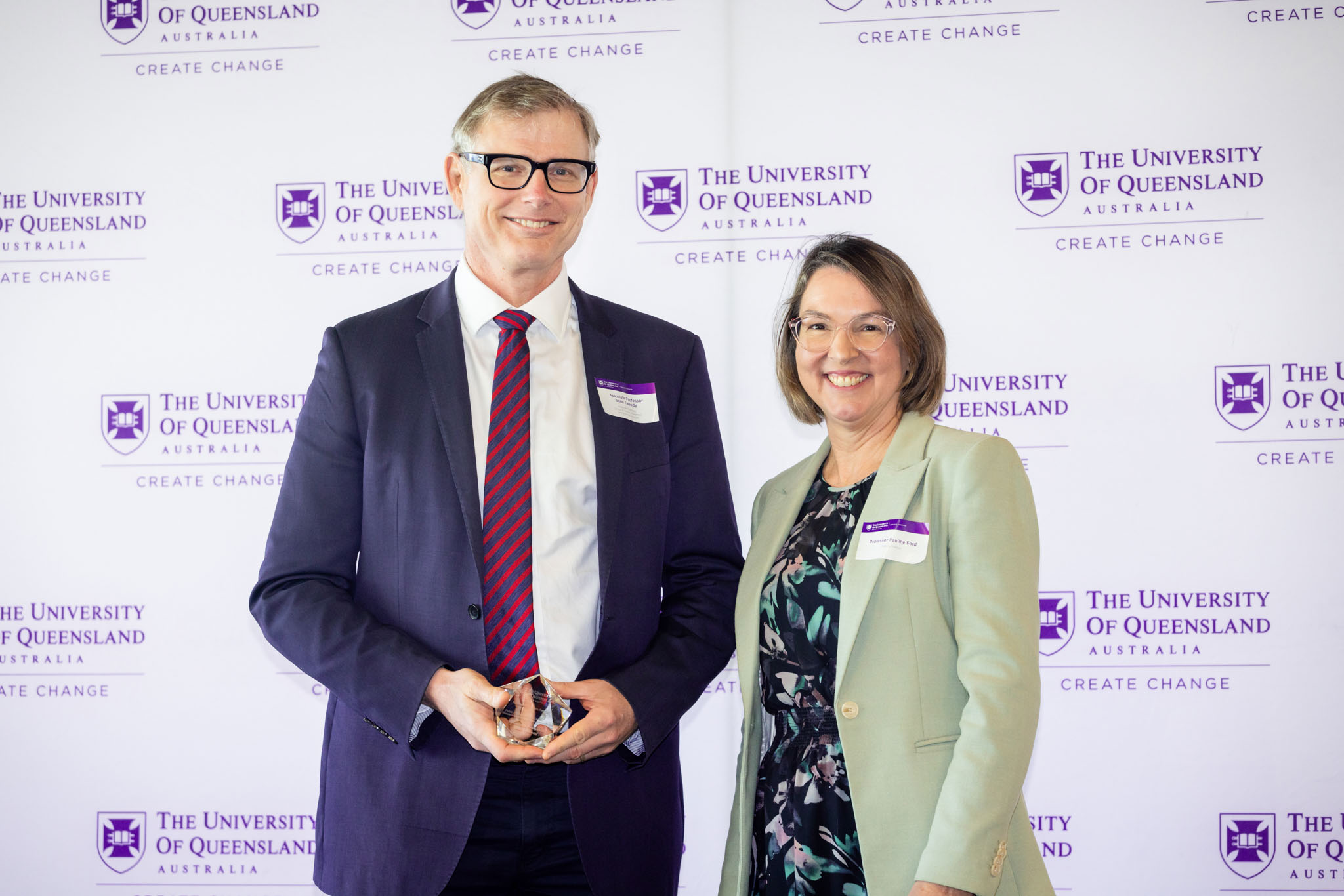
Nominees:
Consumer and Community-Involvement*
Cross-Cultural Well-being*
Brain Builders: Neuroscience into neighbourhoods*
Leadership in Research Support & Management
WINNER: Professor John Macarthur, School of Architecture, Design & Planning (Individual)
Professor John Macarthur has had a distinguished career marked by exceptional leadership and an unwavering commitment to advancing architectural scholarship at UQ. His contributions to architectural history and research have garnered international recognition, establishing him as a preeminent scholar in the field. He has been an influential educator, imparting a passion for architectural history and critical thinking to generations of students. Professor Macarthur's mentoring prowess shines through his dedication to advising higher-degree research students. Moreover, he has left an indelible mark on the architectural research community through his founding and nurturing of the ATCH research group, which has served as a model for similar groups at other institutions, fostering international collaborations and propelling the careers of emerging scholars. Additionally, his leadership as a former Head of School and Research Director has significantly improved the research landscape within the School of Architecture, marked by strategic thinking, institutional insight, and unwavering advocacy for research, especially in supporting young academics, including women, on their paths to leadership roles.

WINNER: HaBS Research Administration Community of Practice (Team)
The Faculty of Health and Behavioural Sciences (HaBS) Research Administration Community of Practice (CoP) stands as a beacon of exemplary leadership in research support and management. Comprising dedicated members from the HaBS Faculty, schools, and centres, this community fosters a collaborative environment where knowledge sharing and best research management practices are paramount. Their monthly meetings cover a range of topics that enhance research support, performance, and culture, including embedding UQ values, budgeting, grant application training, and more. Over the past two years, the CoP has led to transformative innovations benefiting the HaBS research community and beyond. Notable achievements include supporting a strategic shift in funding submissions to MRFF, resulting in a remarkable increase in successful applications. They have also designed processes complementing UQ Research Office efforts, initiated a research management onboarding program for newly appointed researchers, and facilitated crucial conversations regarding clinical trial terminology across UQ. The HaBS CoP is instrumental in developing well-rounded research administrators and fosters a culture of continuous improvement and collaboration, bridging connections within HaBS and beyond.
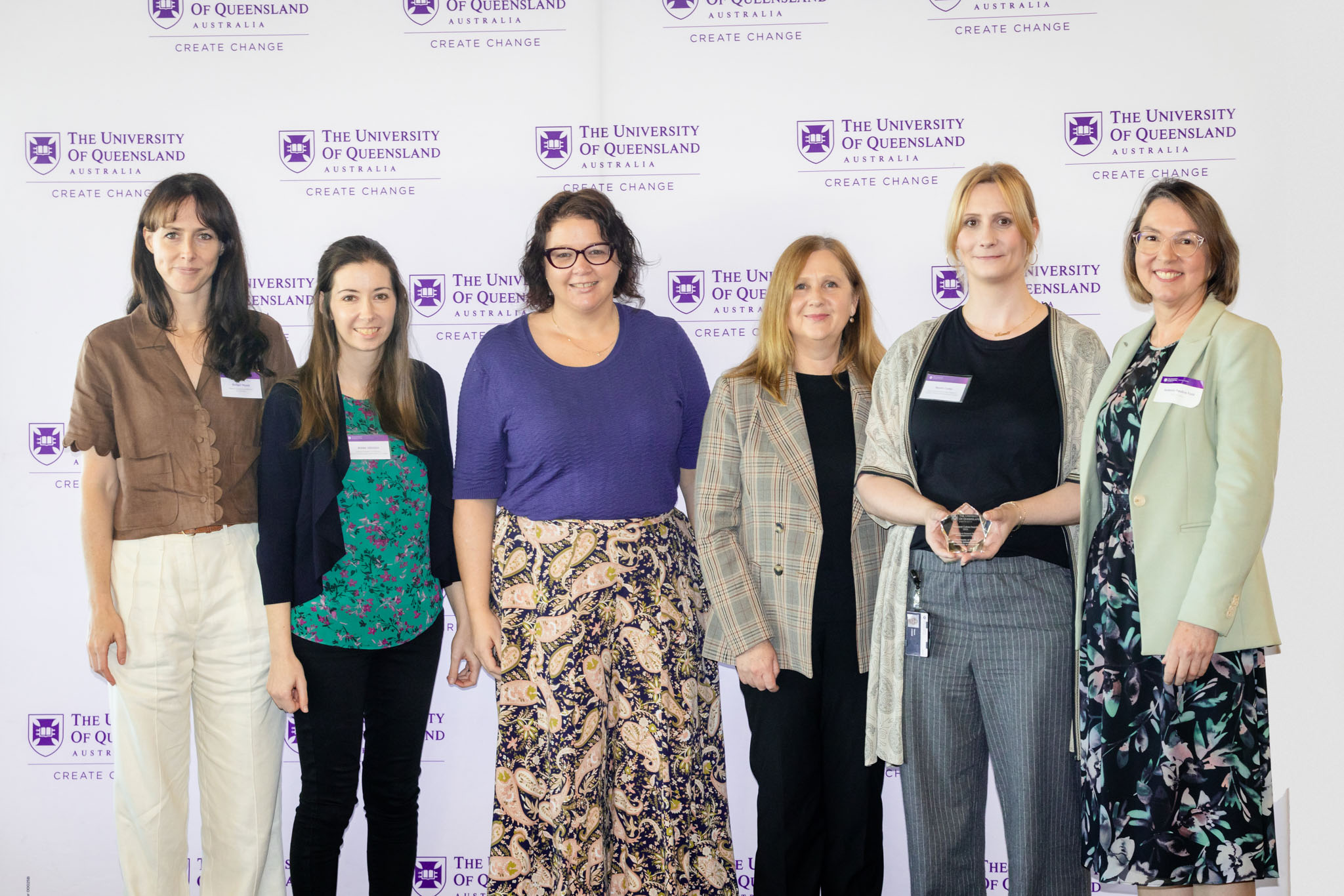
Nominees:
Ms Senel Idrisoglu
Professor Matthew Hornsey
Dr Jaya Seneviratne
Professor Sara Dolnicar
Dr Sara Gollschewski
Associate Professor Judith Greer
Associate Professor Kevin Jack
Genome Innovation Hub*
Protein Expression Facility*
Service Innovation Alliance Research Hub*
Journal Search Tool Development*
MyResearch Projects*
School of Public Health Research Support*
*Team
See all the photos from the 2023 Research Culture Awards here.

